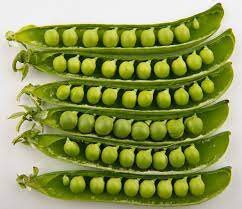Green peas are famous for their health benefits and flavorful nutty taste. The benefits of peas primarily include boosting dietary fibers and vitamin C, some of the most dominating nutrients present in these small green superfoods, to your meals. In fact, most of the benefits of peas are derived from these two nutrients; Vitamin C and dietary fiber. Some of the significant benefits of green peas include promoting healthy digestion and its antioxidant ability that lowers the risk of free-radical damage.
But it is not just health benefits where green peas score. The mild-grassy taste of this green vegetable lends itself to add flavor to a variety of dishes. In Indian cuisine, a range of recipes like matar-paneer, aloo-matar, peas pulao, and methi-malai-matar have peas playing the role of a central ingredient. But before we discuss the amazing benefits that these seeds have to offer, let’s take a look at the nutritional value of peas.
Quick Recipes with Peas: Include this diet source in your meals.
Table of Contents
Watch: Benefits Of Peas You Should Know
Related Reading:
Which is the best frozen peas brand in the market? Worry not. We reviewed and found the best frozen peas brand in India.
Nutritional Value Of Peas
Though small in size, peas are a storehouse for essential nutrients such as vitamins, minerals, and fibers. Vitamin A, B6, and C are some of the main vitamins present in green peas that provide them with a certain beneficial quality. With minerals such as potassium, consuming peas as a part of your regular diet can reduce blood pressure and lowers the risk of stroke.
Benefits Of Peas
Just like any other nutritionally dense food item, peas have a long list of benefits that correspond with their consumption. Let’s take a detailed look at all the benefits of peas – from aiding digestion to improving immunity.
1. Peas Have An Antioxidant Quality

Peas are loaded with different kinds of vitamins. They have a robust free-radical scavenging antioxidant property linked with their consumption. Free radicals, or free oxygen atoms, are present in the bloodstream.
These free-roaming particles are responsible for combining with healthy cells and exerting oxidative stress over the cell walls, thus damaging them in the process. Free-radical damages are typically linked with age-related concerns and tissue inflammation problems.
However, an antioxidant-rich diet can lower the free radical concentration in the bloodstream. This, in turn, lowers the risk of free radical damage, thus keeping the age-related concerns at bay.
2. Good For Weight Loss
One of the macro-nutrient present in peas is fiber, and they are particularly loaded with it. Dietary fiber is referred to as the non-digestible part of the food, and hence it requires more time to digest them. This is part of the reason why peas are essential for weight loss, as they help in keeping you filled for long and prevent you from overeating. In addition to that, a fiber-filled food item is harder for the stomach to digest and requires an extra amount of work from your stomach.
Due to this, your body ends up burning more calories (as peas are low in calories). This also makes peas a negative calorie food, as it promotes weight loss by burning a few calories and improving metabolism.
3. Manages Blood Sugar
This is another benefit of green peas that is derived from the presence of high fiber. As fiber helps in slowing down the digestion process, we can state that this leads to slower absorption of glucose by the system. This, in turn, gives the pancreas enough time for the secretion of an appropriate amount of insulin (a hormone used for breaking down glucose molecules into energy), thus preventing sudden spikes in blood sugar levels.
4. Improves Immunity
The antioxidant quality of peas also comes into play when it comes to strengthening your immunity. These antioxidants are responsible for protecting immune cells from the attack of free radicals. Furthermore, adequate consumption of antioxidants can help lower the rate of progression of age-related disorders such as Alzheimer’s or Parkinson’s disease.
5. Peas Are A Great Choice For Pregnant Women

Peas are a rich source of folate, which is also considered to be one of the essential nutrients during pregnancy. It can contribute to the healthy development of the child’s brain and spinal cord. A daily intake of 400 micrograms of folate might just be enough for this purpose.
By increasing the production of red blood cells, the consumption of folate helps develop the neural tube development that benefits the brain and the spinal cord of the baby.
6. Great For Vision – Benefits of Green Peas for Eye Health
There is a reason why people often advise others to opt for green vegetables to improve their eyesight. Peas are particularly rich in vitamin A, which in turn is an essential element for better vision. This vitamin helps protect the eye’s surface against damaging free radicals and helps maintain a healthy mucous membrane.
Other antioxidants, such as lutein and carotenes, which are also present in peas, further accelerate its work and make it more efficient.
7. Increases The Level Of Oxygen In The System
Apart from potassium, the other mineral present in peas is iron, which plays an essential role in the transfer of oxygen throughout the system.
Iron is an essential mineral that aids in hemoglobin production (the oxygen-carrying cell in the bloodstream). Thus, having a diet loaded with iron would eventually aid in the healthy production of hemoglobin and increase oxygen supply to every other organ, ensuring their proper functioning. Moreover, the consumption of peas, which are riddled with iron, helps in the prevention of other oxygen deficiency disorders, such as anemia.
8. Maintains Blood Pressure
Thanks to the adequate amount of phosphorus present in peas, their consumption has proven to be quite important for controlling your blood sugar. Minerals such as phosphorus exert a dilating effect on the inner lining of the blood vessels and can prevent them from constricting, which helps in lowering the blood pressure.
9. Benefits of Peas in Strengthening Bone Structure
Though vitamin D is a necessity for the development of bones, it does not work as well all by itself. The other requirement for the maintenance of one’s bone structure is vitamin K, which is abundantly present in peas. Vitamin K works alongside calcium in increasing the structural density of your bones. It helps in anchoring the calcium inside of the bones, thus lowering its rate of removal by the body.
Related Reading:
Frozen green peas in the house and bored with the same recipes all the time? Here are the various ways of cooking frozen green peas.
Peas Storage And Availability

Peas are a winter crop, thus fresh peas can be readily available from December to April, though dry peas can be available throughout the year. Eating fresh peas is a joy by itself, for the ‘right after harvest’ peas have a more sweet and starchy feel to it. Peas that have a wrinkled surface or an over-matured yellow color must be avoided during selection. Fresh peas that feel heavy in hand should be your go-to choice when it comes to picking them up.
The best place to store fresh peas would be a refrigerator, which can only keep them fresh for 2-3 days. However, if you are looking for something with a higher shelf life, then frozen peas might be the correct answer to your query.
Serving And Preparation
The best way of preparing peas is quite well known. The splitting open of the husk and trimming of the stalk end, thus revealing the green globule-shaped peas, is somewhat common for preparation. Its grassy and nutty mixture of flavors makes it a great addition to your meal, and it complements other veggies such as onion, potatoes, etc.
Peas can also prove to be a great addition to your soup.
Side-Effects Of Peas
Every food item that we consume has some sort of side-effects linked with their consumption, and there is no surprise that an unregulated consumption of peas can also be damaging to one’s health.
One major side-effect linked with their heavy consumption is the rising level of Vitamin K in your system. Though this vitamin is quite essential when it comes to keeping your bones healthy, a high level of vitamin K can also thin your blood and lowers its platelet count. This could further result in slower wound repair and heavy blood loss.
Its high dietary fiber content can also have a negative effect on your health. Fibers are responsible for slowing down your digestion, thus it requires your body an extra amount of time to completely digest it. If you load up too much on fibers, it might lead to excessive weight gain, which is the opposite of their weight-loss benefit.
Final Words
Though peas can be highly beneficial for your health, it is still more important for you to have a balanced diet with the right amount of everything.
The bottom line is that you must take note of your consumption no matter what you eat.
Frequently Asked Questions
Here we have answered a few interesting FAQs about green peas.
1. Why are peas not good for you?
Green peas have a high GI value, which makes them unsuitable for diabetic people.
2. Are peas inflammatory?
Peas are anti-inflammatory, which helps in lowering the risk of inflammatory conditions.
3. Are peas high in sugar?
Peas are high in sugar and they can spike blood sugar levels. People with diabetes should consume it in moderation.
4. Are frozen peas healthy?
Nothing beats fresh vegetables in nutrients. But if there’s no option, one can definitely have frozen peas. They are healthy and packed with nutrients.


